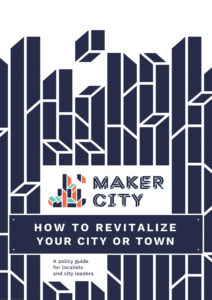 Throughout the United States cities, towns, and communities are suffering wherever industry has left town. Both economic and civic vitality are compromised. The symptoms are all too common: boarded up storefronts; corners populated by people—both young and old—neither in school nor able to find meaningful work; and declining kindergarten enrollments, indicative of young adults and their children fleeing smaller cities in favor of opportunity elsewhere. However, there is hope. The Maker City Project has identified a rich set of emerging tools and approaches available to help turn cities around. By applying new techniques to traditional economic development problems, “innovation partners” can serve as reinforcements to help a city or region that is stuck get unstuck. An innovation partner is a NGO*–generally a nonprofit–that comes from outside the community with a methodology that has been tried, tested, and shown to get measurable results in another area or region.
Throughout the United States cities, towns, and communities are suffering wherever industry has left town. Both economic and civic vitality are compromised. The symptoms are all too common: boarded up storefronts; corners populated by people—both young and old—neither in school nor able to find meaningful work; and declining kindergarten enrollments, indicative of young adults and their children fleeing smaller cities in favor of opportunity elsewhere. However, there is hope. The Maker City Project has identified a rich set of emerging tools and approaches available to help turn cities around. By applying new techniques to traditional economic development problems, “innovation partners” can serve as reinforcements to help a city or region that is stuck get unstuck. An innovation partner is a NGO*–generally a nonprofit–that comes from outside the community with a methodology that has been tried, tested, and shown to get measurable results in another area or region.
The purpose of this policy brief is to introduce three NGOs, describing both their methodologies and results; to inspire city leaders, economic development teams, and localists with the tools they need to move from hopelessness to tangible progress; to create a renewed sense of community; and to understand how and when to invite an innovation partner to come in and inject their methodology, thinking, and best practices. You and your organization still own the problem, but, by inviting an innovation partner to partner with you, you can help accelerate the solution with a methodology and processes that have been tested elsewhere.
You can download the policy brief, which profiles Rising Tide Capital, Innovation Collective, and Hope Street Group as well as some great work being done in Kokomo (Indiana) that leverages our book and Louisville (Kentucky) under the auspices of Interapt here:
Don’t miss the end of the policy brief where we discuss two additional models for innovation of importance to localists.
Nan Braun, a Maker advocate in Kokomo, Indiana fielded a book club based upon the Maker City book we published last year. The purpose of the book club was to insert recommendations on economic revitalization into the city’s 15-year plan.
Angur Gopal is CEO of Interapt, a Louisville, Kentucky company that works to train former coal miners tech workers (coders, remote IT) through an unique collaboration with TEKY (Tech Hire Eastern Kentucky).
*Non-governmental agency.
